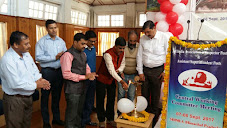Government of India, in consultation with Reserve Bank of India (RBI), has decided to issue Sovereign Gold Bonds. The Bonds will be issued on November 26, 2015. Applications for the bond will be accepted from November 05, 2015 to November 20, 2015. The Bonds will be sold through banks and designated post offices as may be notified. The borrowing through issuance of the Bond will form part of market borrowing programme of Government of India.
|
Sl. No.
|
Item
|
Details
|
|
1
|
Product
name
|
Sovereign
Gold Bond
|
|
2
|
Issuance
|
To be
issued by Reserve Bank India on behalf of the Government of India.
|
|
3
|
Eligibility
|
The Bonds
will be restricted for sale to resident Indian entities including individuals,
HUFs, trusts, Universities, charitable institutions.
|
|
4
|
Denomination
|
The Bonds
will be denominated in multiples of gram(s) of gold with a basic unit of
1 gram.
|
|
5
|
Tenor
|
The tenor
of the Bond will be for a period of 8 years with exit option from
5th year to be exercised on the interest payment dates.
|
|
6
|
Minimum
size
|
Minimum
permissible investment will be 2 units (i.e. 2 grams of gold).
|
|
7
|
Maximum
limit
|
The maximum
amount subscribed by an entity will not be more than 500 grams per person per
fiscal year (April-March). A self-declaration to this effect will be
obtained.
|
|
8
|
Joint
holder
|
In case
of joint holding, the investment limit of 500 grams will be applied to the
first applicant only.
|
|
9
|
Frequency
|
The Bonds
will be issued in tranches. Each tranche will be kept open for a period to be
notified. The issuance date will also be specified in the notification.
|
|
10
|
Issue
price
|
Price of
Bond will be fixed in Indian Rupees on the basis of the previous week’s
(Monday–Friday) simple average of closing price of gold of 999 purity
published by the India Bullion and Jewellers Association Ltd. (IBJA).
|
|
11
|
Payment
option
|
Payment
for the Bonds will be through electronic funds transfer/cash payment/ cheque/
demand draft.
|
|
12
|
Issuance
form
|
Government
of India Stock under GS Act, 2006. The investors will be issued a Stock/Holding
Certificate. The Bonds are eligible for conversion into demat form.
|
|
13
|
Redemption
price
|
The
redemption price will be in Indian Rupees based on previous week’s
(Monday-Friday) simple average of closing price of gold of 999 purity published
by IBJA.
|
|
14
|
Sales
channel
|
Bonds
will be sold through banks and designated Post Offices, as may be notified,
either directly or through agents.
|
|
15
|
Interest
rate
|
The
investors will be compensated at a fixed rate of 2.75 per cent per annum payable
semi-annually on the initial value of investment.
|
|
16
|
Collateral
|
Bonds can
be used as collateral for loans. The loan-to-value (LTV) ratio is to be set
equal to ordinary gold loan mandated by the Reserve Bank from time to time.
|
|
17
|
KYC Documentation
|
Know-your-customer
(KYC) norms will be the same as that for purchase of physical gold. KYC
documents such as Voter ID, Aadhaar card/PAN or TAN /Passport will be
required.
|
|
18
|
Tax
treatment
|
The
interest on Gold Bonds shall be taxable as per the provision of Income Tax
Act, 1961 (43 of 1961) and the capital gains tax shall also remain same as in
the case of physical gold.
|
|
19
|
Tradability
|
Bonds
will be tradable on exchanges/NDS-OM from a date to be notified by RBI.
|
|
20
|
SLR eligibility
|
The Bonds
will be eligible for Statutory Liquidity Ratio.
|
|
21
|
Commission
|
Commission
for distribution shall be paid at the rate of 1% of the subscription amount.
|

